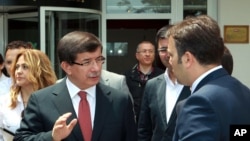ISTANBUL, Turkey - The crisis between Turkey and Syria over Syria's shoot-down of a Turkish military jet has deepened, with Ankara saying the plane was shot down while it was in international airspace. Turkey is now looking for NATO's support.
Speaking Sunday on state-run TRT television, Turkish Foreign Minster Ahmet Davutoglu said the pilots were testing the jet's radar capabilities when it was downed Friday over the Mediterranean.
"The warplane was shot down over international waters several minutes after it had left Syrian airspace," he said.
Damascus claims the plane was shot down while flying low and fast one kilometer off its coast. Davutoglu said the jet had strayed into Syrian airspace by mistake and immediately left after it was warned by Turkish air controllers.
Analysts say the admission the plane was in Syrian airspace will likely fuel growing calls by Turkish opposition politicians to know why the plane was flying so close to Syria, with relations between the two countries so tense.
On Saturday, Turkey's Deputy Prime Minister Bulent Arinc said the jet was a reconnaissance plane.
Damascus has accused Ankara of providing weapons and intelligence on its forces to Syrian rebels.
But Davutoglu denied the plane was involved in any covert action.
"The plane was not on a covert operation - it was on training mission to test radar, and the plane was unarmed," he said.
Turkey's prime minister has said he will be discussing the situation with the leaders of the main opposition.
Under Turkey's constitution, any military action against a foreign country has to be sanctioned by parliament, although ministers have played down speculation of any imminent armed response.
Political observers in Turkey say despite tense relations with Syria, the Turkish government response has so far been restrained and measured. U.N. Secretary-General Ban Ki-moon praised Ankara's behavior in the crisis.
Ankara is now seeking to build international support. The Turkish foreign minister said he will be meeting with NATO envoys on Tuesday under Article 4 of the alliance's founding treaty, which commits all members to protect one anothers' security and borders.
Turkey's government has promised its response will be strong, decisive and legitimate once the facts are known. The severity of that response could depend on the level of international support, along with the fate of the two pilots who remain missing.
Speaking Sunday on state-run TRT television, Turkish Foreign Minster Ahmet Davutoglu said the pilots were testing the jet's radar capabilities when it was downed Friday over the Mediterranean.
"The warplane was shot down over international waters several minutes after it had left Syrian airspace," he said.
Damascus claims the plane was shot down while flying low and fast one kilometer off its coast. Davutoglu said the jet had strayed into Syrian airspace by mistake and immediately left after it was warned by Turkish air controllers.
Analysts say the admission the plane was in Syrian airspace will likely fuel growing calls by Turkish opposition politicians to know why the plane was flying so close to Syria, with relations between the two countries so tense.
On Saturday, Turkey's Deputy Prime Minister Bulent Arinc said the jet was a reconnaissance plane.
Damascus has accused Ankara of providing weapons and intelligence on its forces to Syrian rebels.
But Davutoglu denied the plane was involved in any covert action.
"The plane was not on a covert operation - it was on training mission to test radar, and the plane was unarmed," he said.
Turkey's prime minister has said he will be discussing the situation with the leaders of the main opposition.
Under Turkey's constitution, any military action against a foreign country has to be sanctioned by parliament, although ministers have played down speculation of any imminent armed response.
Political observers in Turkey say despite tense relations with Syria, the Turkish government response has so far been restrained and measured. U.N. Secretary-General Ban Ki-moon praised Ankara's behavior in the crisis.
Ankara is now seeking to build international support. The Turkish foreign minister said he will be meeting with NATO envoys on Tuesday under Article 4 of the alliance's founding treaty, which commits all members to protect one anothers' security and borders.
Turkey's government has promised its response will be strong, decisive and legitimate once the facts are known. The severity of that response could depend on the level of international support, along with the fate of the two pilots who remain missing.




